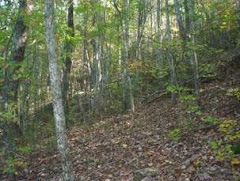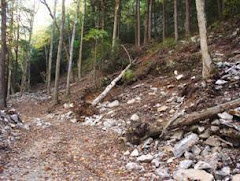http://www.timesfreepress.com/news/2009/nov/27/state-company-reach-tentative-deal-on-cumberland/
By- Andy Sher
Friday, Nov. 27, 2009
NASHVILLE -- Tennessee officials tentatively have agreed to pay a Florida-based company $500,000 for partial mineral rights to about 4,200 acres along Walden's Ridge near Soddy-Daisy.
If accepted by the state and the company, Lahiere-Hill LLC of Florida, the agreement would end a nearly three-year court battle over the company's "harvesting," or commercial digging, of what's known as "mountain stone" in and around Cumberland Trail State Park. Such stone has become very popular for use in home patios, fireplaces and facades.
Members of the State Building Commission's Executive Subcommittee unanimously approved the proposed settlement this week.
"We consider this process today to be the first step in that approval process," Elizabeth McCarter, senior counsel in the state Attorney General's Environmental Division, told subcommittee members.
Ms. McCarter said the state is getting what it wanted all along, noting "that was our desire from the very beginning -- to make sure this trail could remain secure for the public and for recreational purposes."
The dispute began in early 2007 when hikers reported that contractors for Lahiere-Hill, which owns mineral rights on the property, had moved front-end loaders and other large machinery into the park to tear rock from ravine walls. The rubble wound up blocking the trail, Ms. McCarter said.
Attorneys for the state, which owns the property's surface rights -- which are different than mineral rights -- marched into Hamilton County Chancery Court with a request for an injunction, arguing that, under Tennessee law, mineral rights did not include mountain stone because the stone is not technically a mineral.
The case has rolled around in various courts ever since, but the lawsuit will be dropped if the tentative agreement is accepted.
The proposed agreement now goes to the full State Building Commission. If approved there, it would require the consent of the governor and the state comptroller of the treasury before going into effect, officials said.
Attorney Rick Hitchcock, of Chattanooga, who represents Lahiere-Hill, said he was unable to comment on the matter at this point.
"This involves litigation and settlement in discussion, and I'm not really in a position to speak," he said.
Joe Sanders, chief counsel for the Tennessee Department of Environment and Conservation, said of the proposed settlement that "I think it's a very good deal."
Tennessee already owns the surface rights to the land, and the agreement calls for the state to purchase partial mineral rights on about 1,811 acres along the Cumberland Trail.
Lahiere-Hill would retain oil and gas rights and have the legal right to tunnel under the park to reach minerals on other property it owns.
As part of the deal, Lahiere-Hill also would give up its ability to take stone through the mineral rights it holds on another 2,400 acres of land -- also part of Cumberland Trail State Park -- in the North Chickamauga Creek area. The company would retain its other mineral rights on that land.
The dispute put a spotlight on tensions on Walden's Ridge and the Cumberland Plateau as companies or contractors increasingly go onto state or privately owned land where they hold mineral rights, arguing that mountain stone is a mineral and they have a right to claim it.
Attorneys for three conservation groups -- the Cumberland Trail Conference, Save Our Cumberland Mountains and the Sierra Club -- jumped in and filed to intervene legally in the case.
One of the groups' attorneys said, if the claims of Lahiere-Hill were upheld, "it could open the door to this kind of rock extraction on thousands of acres of public and private lands against the wishes of the surface owners."
The issue moved into the Legislature, where the Bredesen administration pushed a bill to protect owners of surface rights, including the state. That drew condemnation from some lawmakers who blocked the measure and accused the administration of infringing upon mineral owners' rights.
This year, lawmakers passed a more limited law covering land on which the state has surface rights. The law requires rock "harvesters" to post a bond to guarantee they will restore the property after they're done.
AGREEMENT DETAILS
* The state would purchase partial mineral rights from Lahiere-Hill on about 1,811 acres along the trail in Hamilton County. The state would own coal rights and the company would abandon its claim to sandstone rights. Lahiere-Hill would retain its oil and gas rights.
* Lahiere-Hill also would give up its ability to take stone through mineral rights it holds on another 2,400 acres of land -- also part of Cumberland Trail State Park -- in the North Chickamauga Creek area. The company would retain its other mineral rights on the land.
Source: State officials, Tennessee Department of Environment and Conservation
Friday, December 11, 2009
Subscribe to:
Posts (Atom)

